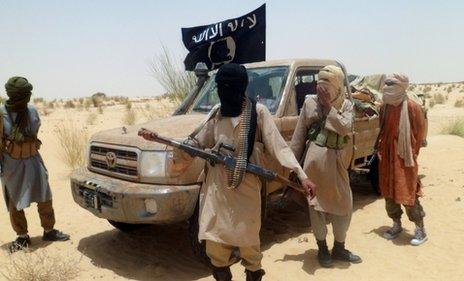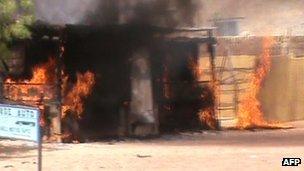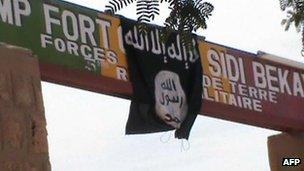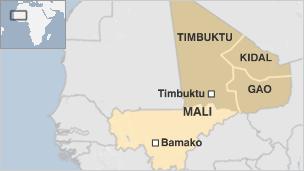Life in Timbuktu under Islamist rule
- Published

An Islamist militant group has taken control of the fabled city of Timbuktu in northern Mali. Although the city was once a centre of Islamic learning, the group has objected to some local practises.
So what is their agenda? And will they respect the city's unique literary heritage?
Since seizing the city in March, Ansar Dine has targeted Timbuktu's precious Muslim heritage.
The shrine of a 15th Century sufi saint Sidi Mahmoud Ben Amar has been attacked, according to Lazare Eloundou Assomo of Unesco.
"The entrance gate of the mausoleum was completely destroyed and burnt," Mr Assomo told the BBC World Service. "The curtain that protected the shrine was destroyed."
'Prisoners'
Timbuktu is known as the city of the 333 saints, says Alida Jay Boye, author of Hidden Treasures of Timbuktu.
The fundamentalist Salafi branch of Islam objects to the veneration of saints' tombs, maintaining that it amounts to saint worship.
"Salafis do not want there to be any intermediary between the believer and God. It looks like Ansar Dine is going after shrines just like other groups have done in Egypt, Morocco and Tunisia," she says.
Neil Whitehead, a former hotelier in Timbuktu, has fled to Morocco because of the recent unrest.
He says that conditions are deteriorating in the city.
"The Salafis are turning on the locals, raiding their homes and taking anything of value, together with any food. All shops are shut and, in the words of our friends, 'everything is broken'," he said.
"They have introduced a form of Sharia and the locals feel like prisoners in their houses."

Bars in Timbuktu have reportedly been set on fire
His account is confirmed by Mari Touri, a Timbuktu resident.
"There is no food in the shops, no stocks of supplies, because everything in Timbuktu comes from Bamako in the south and it cannot get through at the moment."
Another resident, Youba Ag Moha, said that the situation in the city was "calm" but that government offices were closed and there was a problem with the electricity supply.
There are also concerns for the city's wealth of manuscripts.
Schools reopened
Stephanie Diakite, an expert on the city's literature, says she is worried about Timbuktu's public and private libraries, and is calling for the heritage and the scholars who work on it to be protected.
Minor damage has been done to the Ahmed Baba Library, which houses some 40,000 manuscripts, a fraction of the historical manuscripts in the city.
Ansar Dine militiamen are guarding the building, which is currently closed to the public.
"Ansar Dine says that is here to protect the city," says Mr Touri.
Ansar Dine has allowed schools to reopen in Timbuktu and another northern city, Gao, but only on condition that boys and girls sit separately.
'Wrong mosques'
Ansar Dine is led by Iyad Ag Ghaly, a Tuareg from an aristocratic family.
He is no simple ideological Islamist.
He has been a player in Malian Tuareg politics since at least the 1990s, when he led a Tuareg rebellion against the governments of Mali and neighbouring Niger.

The Islamists' flag is now flying over Timbuktu's main military barracks
Following the end of the rebellion, he was pardoned and was involved in negotiating the release of the many Western hostages held in the Sahara.
Mr Ghaly's career has oscillated between opposition and cooperation with the Malian government.
In 2006 he was involved in another abortive rebellion. But in 2007 he helped negotiate a settlement between the rebels and the Malian state.
Eventually in 2008, he was sent to Saudi Arabia as Mali's consul in Jeddah but he was recalled soon afterwards.
Jeremy Keenan, an academic expert on the politics and peoples of the Sahara, suggests that Mr Ghaly had become involved in Salafi circles while in Saudi Arabia.
"He was spending a lot of time in the wrong mosques," Mr Keenan said.
Mr Ghaly returned to Mali and seems to have taken advantage of the 2011 uprising to resume his old role as a leader of Tuareg opposition.
Mr Keenan estimates the current strength of Ansar Dine to be between 100 and 200 fighters, some of whom are under 18.
It is a far smaller group than the force of at least 3,000 men under the control of the National Movement for the Liberation of Azawad, the MNLA, a secular group fighting for Tuareg independence in northern Mali's desert regions.
The two groups together seized control of the north, after the army was distracted when it staged a coup. But relations between the secular MNLA and Ansar Dine are poor.
In April, the MNLA declared independence for Azawad, its name for the three northern provinces of Mali where most ethnic Tuaregs live.
Ansar Dine has rejected independence, however, claiming that it is fighting "a holy war" in favour of Islamic rule.
For its part, the MNLA claims that it has the situation in hand and will turn its attention to Ansar Dine in due time.

Yet so far it seems to have made no moves to do so.
According to Timbuktu resident Youba Ag Moha, the MNLA controls the airport, while Ansar Dine controls the military base opposite the grand mosque and "commands" the centre of the city.
Mr Keenan suggests that Ansar Dine's continuing freedom of movement may be because it enjoys the protection and support of Algeria, Mali's northern neighbour.
But why would secular Algeria wish to support Islamists on its southern flank?
The answer, suggests Mr Keenan, is that these groups allow Algeria to project power in what it sees as its sphere of influence while simultaneously justifying the existence of Algeria's security apparatus.
Whatever the truth of the matter, in the meantime, Ansar Dine's black flag is flying over Timbuktu.